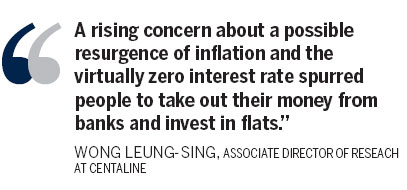City's home prices climb to 12-yr high
Updated: 2010-04-24 06:31
By Li Tao(HK Edition)
|
|||||||||
Inflation fears spurring speculative purchases as a hedge: Centaline
Home prices in the city rose to a 12-year high last week, as indicated by the popular property price index compiled by Centaline Property Agency Ltd and City University of Hong Kong, after home buyers and investors snatched up assets amid a low-interest-rate environment and in anticipation of future inflation.
Flat prices maintained a stable uptrend this year. From around 76 points in January this year, the Centa-City Leading Index, which tracks prices of existing homes in the city, had risen to 79.39 as of April 18, up 1.2 percent from 78.48 at the end of the preceding week.
The latest reading on the price chart was the highest level since January 4, 1998 when the index stood at 80.71.
The continued rise in home prices came despite the fact that local flat supplies have increased over the past three months.
Data released by the Transport and Housing Bureau in the same day indicated that flats built by private developers in the first quarter reached 4,900 units, more than triple the 1,600 units built a year earlier.
"The soaring home prices in Hong Kong cannot be explained simply by the laws of supply and demand. A rising concern about a possible resurgence of inflation and the virtually zero interest rate spurred people to take out their money from banks and invest in flats. We have noticed that many investors have settled deals with cash without the need for any mortgage, and most of them, we believe, are speculators," said Wong Leung-sing, associate director of research at Centaline.
"Speculators from the mainland account for less than 20 percent of home purchases in the Hong Kong property market, and many of them focus only on luxury houses. Hong Kong residents in fact possess huge sums of cash, and other than buying properties, they have no idea of how to maintain the value of their savings in face of the inflationary pressure," Wong added.
The over-heated real estate market has drawn ample attention from authorities. Financial Secretary John Tsang said earlier in the week that the government may increase stamp duties on some property transactions and accelerate government land auctions later on.
"The government is deeply concerned about the rising trend of property prices, and I agree that we need to reduce the risk of a bubble in the property market in order to avoid any impact on the financial system's stability and the recovery in the real economy," he told lawmakers Wednesday.
Tsang also announced measures to curb possible price manipulations by developers in new project launches, including requiring developers to disclose transactions involving board members within five days of the transaction, to release a price list three days ahead of launching a project and to put up more flats for sales in the initial launch of a project.
"These measures may effectively cool the market for a short while. The transaction volume is expected to drop and prices will stop surging in the next two months. However, if the government's planned land auctions fetch record prices, home prices will inevitably rise again, which, apparently, is not what the authority likes to see," said Wong.
Wong said it is difficult to draw a definite picture for the long-term outlook for the property market. But he predicts that the price index may be fluctuating around the 79 level in the second quarter. "The outlook for the market will be clearer in the second half this year when land auctions are conducted," he said.
Hong Kong's home prices increased as much as 29 percent in 2009, and gained another 8.4 percent in the first quarter this year.
China Daily

(HK Edition 04/24/2010 page3)